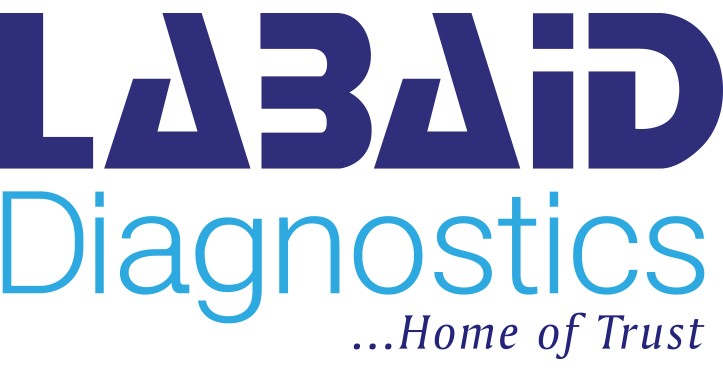Understanding Infertility
Infertility happens when a couple cannot conceive after having regular unprotected sex for atleast 12 months.
Overview
Infertility happens when a couple cannot conceive after having regular unprotected sex for atleast 12 months.
Men and women are equally likely to have fertility problems. In general:
- In about one-third of cases, there is an issue with the man
- In about one-third of cases, there is an issue with the woman
- In the remaining cases, there are issues with both the man and the woman, or no cause can be found
Infertility can be primary or secondary.
Primary infertility is when a couple has not conceived after trying for at least 12 months without using birth control.
Secondary infertility is when they have previously conceived but are no longer able to.
What are the main causes of infertility in men?
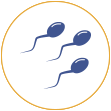
Low Sperm Count

Low sperm motility

Abnormal sperm
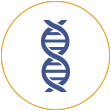
Genetic disorders

Obesity

Smoking

Harmonal Disorders

Hypospadias

Cystic Fibrosis

Age

SmokingAlcohol consumption

Radiation Therapy

Varicoceles

Medical condition
- Low Sperm Count:A sperm count of under 15 million is considered low.
- Low sperm motility:In this case, the sperm is not able to reach the egg.
- Abnormal sperm: The sperm may have an unusual shape, making it harder to move and fertilize an egg.
- Medical condition:e.g. testicular infection, cancer, cushing’s syndrome, diabetes, thyroid disease.
- Genetic disorders:e.g. Klinefelter's syndrome, Myotonic dystrophy may cause no sperm to be produced, or low numbers of sperm to be produced.
- Hypospadias:The urethral opening is under the penis making it harder for the sperm to get to the female's cervix.
- Cystic Fibrosis:a chronic disease that results in the creation of sticky mucus and males may also have a missing or obstructed vas deferens. The vas deferens carries sperm from the epididymis to the ejaculatory duct and urethra.
- Radiation Therapy:It can impair sperm production.
- Age:Male fertility starts to fall after 40 years.
- Alcohol consumption:It may lower male fertility.
- Obesity:It may reduce the chances of conceiving.
- Smoking:Smoking significantly increases the risk of infertility in both men and women.
- Varicoceles:A condition in which the veins in the testicles are large and cause them to overheat. The heat may affect the number or shape of the sperm.
- Hormonal disorders:Improper function of the hypothalamus or pituitary glands may result in low or no sperm production.
What are the main causes of infertility in women?

Age

Alcohol consumption

Smoking

Obesity
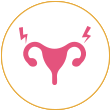
Tubal Infection

Endometriosis

Diet

Mental Stress

Ovulation Disorders
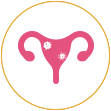
Submocusal Fibroids

Radiation Therapy

Autoimune disorders
- Age: The ability to conceive starts to fall around the age of 32 years.
- Smoking: Smoking significantly increases the risk of infertility in both men and women. Smoking during pregnancy increases the chance of pregnancy loss. Passive smoking has also been linked to lower fertility.
- Alcohol consumption: It can affect the chances of conceiving.
- Obesity: It may reduce the chances of conceiving.
- Diet: A lack of folic acid, iron, zinc, and vitamin B-12 in the diet can affect fertility.
- Mental stress: This may affect female ovulation and can lead to reduced sexual activity.
- Ovulation disordersare the most common cause of infertility in women and can be due to:
- Polycystic ovary syndrome (PCOS):A condition that causes women to not ovulate, or ovulate irregularly.
- Diminished ovarian reserve (DOR):A condition in which fewer eggs are remaining in the ovaries than normal. The number of eggs a woman has declines naturally as a woman ages.
- Functional hypothalamic amenorrhea (FHA):A condition when the menstrual cycle and ovulation are disrupted due to the hypothalamus not working properly.
- Primary ovarian insufficiency (POI): A condition sometimes referred to as premature menopause, occurs when a woman’s ovaries fail before she is 40 years of age.
- Menopause: An age-appropriate decline in ovarian function that usually occurs around age 50. By definition, a woman in menopause has not had a period in one year.
- Poor egg quality:Eggs that are damaged or develop genetic abnormalities cannot sustain a pregnancy.
- Hyperprolactinemia:If prolactin levels are high, and the woman is not pregnant or breastfeeding, it may affect ovulation and fertility.
- Thyroid problems:An overactive or underactive thyroid gland can lead to a hormonal imbalance.
- Submucosal fibroids: Benign or non-cancerous tumors occur in the muscular wall of the uterus preventing sperm from fertilizing the egg.
- Endometriosis:A condition in which the type of tissue that forms the lining of the uterus is found outside the uterus. Inflammation from endometriosis may damage the sperm or egg or interfere with their movement through the fallopian tubes and uterus. In severe cases of endometriosis, the fallopian tubes may be blocked by adhesions or scar tissue.
- Tubal Infection:Also known as Fallopian Tube Infection, is caused by unwarranted and excessive growth of malignant bacteria in the fallopian tubes. Some of the bacteria causing the tubal infection include Streptococcus, Mycoplasma, and Staphylococcus. The disease can also be caused by sexually transmitted diseases (STDs) e.g. Chlamydia, Gonorrhea, etc.
- Radiation therapy:It can increase the risk of fertility problems.
- Autoimmune disorders:Autoimmune disorders cause the body's immune system to attack normal body tissues that it would normally ignore. Autoimmune disorders, such as lupus, Hashimoto's and other types of thyroiditis, or rheumatoid arthritis, may affect fertility.
What are the risk factors linked to Infertility?
Vitamin D deficiency is a condition wherein there is a reduced amount of Vitamin D in the body. The most common cause of vitamin D deficiency is the lack of sunlight exposure, which may be coupled with poor dietary sources. It can also be caused by
- Age: Women's fertility gradually declines with age. As a man ages, the number of sperm decreases, along with sperm motility, thus reducing the chances of pregnancy occurring. Other age-related problems include low testosterone and prostate, erectile, or ejaculation problems.
- Tobacco use: Smoking may reduce the likelihood of pregnancy. Miscarriages are more frequent in women who smoke. Smoking can also increase the risk of erectile dysfunction and a low sperm count in men.
- Alcohol: Alcohol use may contribute to infertility. For men, heavy alcohol use can decrease sperm count and motility.
- Obesity: An inactive lifestyle and being overweight may increase the risk of infertility.
- Mental Health: Depression and stress can affect the hormones that regulate the reproductive cycle. Women dealing with these issues may not ovulate normally and men may have a lower sperm count.

Get Regular Exercise

Avoid illicit drugs and tobacco.

Maintain a healthy lifestyle

Avoid Exposure to Environmental Toxins.

Avoid medicines that may affect fertility.

Consume Alcohol in Modernation or avoid it
- Maintain a healthy weight and eat a healthy, well-balanced diet.
- Avoid illicit drugs and tobacco.
- Consume alcohol in moderation or avoid it entirely.
- Get regular exercise at a moderate level of intensity.
- Avoid exposure to industrial or environmental toxins.
- Avoid medicines that may affect fertility.
Following tests can aid in determining causes of infertility and may be recommended by your Doctor:
Luteinising Hormone (LH)Luteinizing hormone (LH) is a hormone associated with reproduction. This test measures the amount of luteinizing hormone in the blood and is used to help diagnose the cause of infertility.
ProlactinProlactin is a hormone whose primary role is to promote breast milk production (lactation). This test measures the amount of prolactin in the blood and may be used, along with other hormone tests in the evaluation of Pituitary tumors, Amenorrhea, Galactorrhea, Infertility & Hypogonadism.
Follicle-stimulating Hormone (FSH)Follicle-stimulating hormone (FSH) is a hormone associated with reproduction and the development of eggs in women and sperm in men. This test measures FSH in the blood and helps in the evaluation of menstrual irregularities, hypogonadism, infertility and helps in diagnosing pituitary disorders.
Estradiol E2Estrogens are a group of steroids that are responsible for the development and function of reproductive organs and the formation of secondary sex characteristics in women. They are also found in men and play a role in bone metabolism and growth in both sexes. This test is used to detect a deficiency or excess in a woman In a man, estrogen testing may be performed to detect a hormone excess and its cause.
ProgesteroneProgesterone is a steroid hormone with the main role to help prepare a woman's body for pregnancy. This test measures the level of progesterone in the blood and is useful for ascertaining whether ovulation occurred in a menstrual cycle. It also helps to evaluate placental function in pregnancy.
Semen AnalysisThis test helps in determining male fertility status. It consists of a series of tests that evaluate the quality and quantity of the sperm as well as the semen, the fluid that contains them.
Testosterone, TotalTestosterone is the main sex hormone in men, produced mainly by the testicles, and is responsible for male physical characteristics. It is present in the blood of both males and females. The testosterone test may be used to help evaluate conditions such as:
- Delayed or early puberty in boys
- Decreased sex drive in men and women
- Erectile dysfunction in men
- Infertility in men and women
- Testicular tumors in men
- Hypothalamus or pituitary disorders
- Hirsutism and virilization in girls and women
Sex hormone binding globulin (SHBG) is a protein produced by the liver that transports the hormones testosterone, dihydrotestosterone (DHT), and estradiol in the blood as biologically inactive forms. This test measures the level of SHBG in the blood and may be used to help evaluate men for low testosterone and women for excess testosterone production.
Anti Mullerian Hormone (AMH)Anti-Müllerian hormone (AMH) is a hormone produced by reproductive tissues, including the testicles in males and the ovaries in females. This test measures AMH in the blood and used to assess ovarian function and menopausal status, evaluation of PCOS in women. It is also used to evaluate the presence of external sex organs that are not male or female in an infant and/or function of the testicles in an infant boy
HysterosalpingographyFluid is injected into the woman's uterus and X-rays are taken to determine whether the fluid travels properly out of the uterus and into the fallopian tubes. If a blockage is present, surgery may be necessary.
Other Imaging ProceduresImaging techniques may be used to determine physical problems preventing proper fertilization or maintenance of a normal pregnancy. The tests performed depends on case to case.
